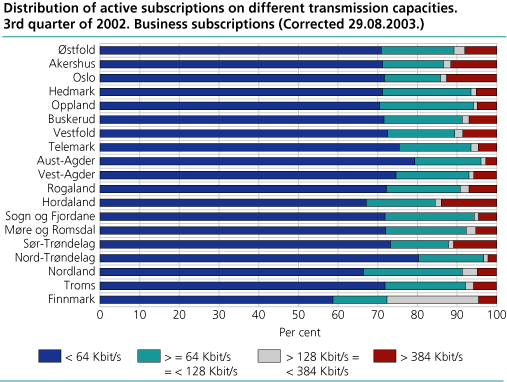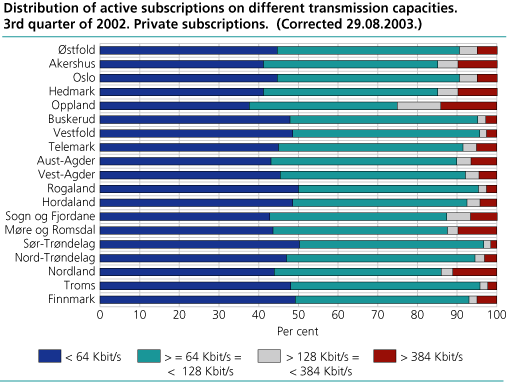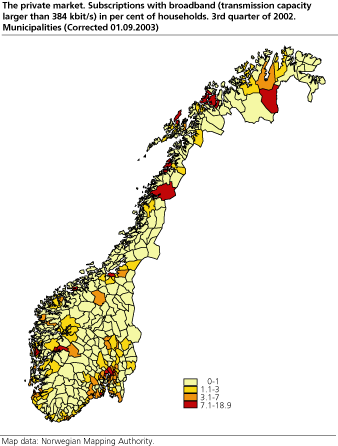Content
Published:
This is an archived release.
Increase in broadband subscriptions
By the end of the 3 r d quarter of 2002 Norway had about 1.5 million active Internet subscriptions. Approximately 113 000 of these were broadband subscriptions, whereas the corresponding figure for 2n d quarter was almost 77 000. One out of eight new subscriptions in the 3r d quarter was a broadband subscription.
During the 3rd quarter of 2002 there were about 280 000 new Internet subscriptions. 13 per cent of these these were broadband subscriptions. Since the end of 2nd quarter the number of broadband subscriptions has increased with almost 50 per cent.
In this survey broadband is defined as Internet subscriptions with a transmission capacity (rate of speed inn) larger than 384 kbit per second. The statistics only include subscriptions provided by commercial Internet service providers.
Half of the subscriptions active
For the 3r d quarter of 2002 Statistics Norway distinguish between the total number of subscriptions and the active ones. Active subscriptions are those that have been used during the last quarter. Broadband subscriptions, often invoiced monthly, are always considered active. This implies that subscriptions in the lower transmission capacities that were drawn a long time ago and no longer in use can be excluded. This gives a more realistic picture of the use of Internet in Norway.
By the end of 3rd quarter of 2002 there were 3.1 million Internet subscriptions in Norway. Only half of these were active.
Analogue modem most used in the business market
10 per cent of all active business subscriptions are broadband, whereas the same figure for private subscripitions is 7 per cent. Subscriptions with an Internet connection via analogue modem and ISDN make up respectively 71 and 17 per cent of all active subscriptions in the business market. For the private market these types of subscriptions constitute both 44 per cent each.
Regional distribution
The figures on subscriptions are also distributed on municipalities. 280 of the 434 muncipalities in Norway have few (less than 10) or no broadband subscriptions. The geographical distribution of broadband is among other things connected with the possibility of taking advantage of technologies like cable, ADSL, etc.
In some cases the municipalities themselves are Internet service providers. One example is the municipality of Modalen where all the households in the municipality are offered broadband. This type of subscriptions is not included in the statistics.
Both private persons and businesses can have several Internet subscriptions and it is similarly possible for several private persons to use the same subscription. The number of subscriptions is therefore not the same as the number of households/businesses with Internet access. However, when it comes to broadband there is reason to expect an almost one-to-one relationship between subscriptions and the households. This is why broadband subscriptions are displayed in per cent of households in the municipalities.
|
Municipalities with most private broadband
subscriptions
by the end of 3rd quarter of 2002 in per cent of the households November 2001. Only commercial Internet Service Providers are included. (Corrected 29.08.2003) |
| Municipalities | Broadband subscriptions in per cent of households | ||||||||||||||||||||||||||||||||||||||
|---|---|---|---|---|---|---|---|---|---|---|---|---|---|---|---|---|---|---|---|---|---|---|---|---|---|---|---|---|---|---|---|---|---|---|---|---|---|---|---|
| Landsgjennomsnitt | 5.0 | ||||||||||||||||||||||||||||||||||||||
| 1233 Ulvik | 18.9 | ||||||||||||||||||||||||||||||||||||||
| 0219 Bærum | 13.9 | ||||||||||||||||||||||||||||||||||||||
| 1601 Trondheim | 11.3 | ||||||||||||||||||||||||||||||||||||||
| 1234 Granvin | 10.4 | ||||||||||||||||||||||||||||||||||||||
| 1833 Rana | 10.3 | ||||||||||||||||||||||||||||||||||||||
| 0301 Oslo | 10.2 | ||||||||||||||||||||||||||||||||||||||
| 1201 Bergen | 9.9 | ||||||||||||||||||||||||||||||||||||||
| 1502 Molde | 9.9 | ||||||||||||||||||||||||||||||||||||||
| 0217 Oppegård | 9.8 | ||||||||||||||||||||||||||||||||||||||
| 1871 Andøy | 9.0 | ||||||||||||||||||||||||||||||||||||||
| 0706 Sandefjord | 8.2 | ||||||||||||||||||||||||||||||||||||||
| 0220 Asker | 8.1 | ||||||||||||||||||||||||||||||||||||||
| 1902 Tromsø | 8.0 | ||||||||||||||||||||||||||||||||||||||
| 2021 Karasjohka-Karasjok | 7.9 | ||||||||||||||||||||||||||||||||||||||
| 0230 Lørenskog | 7.9 | ||||||||||||||||||||||||||||||||||||||
| 1804 Bodø | 7.8 | ||||||||||||||||||||||||||||||||||||||
| 1103 Stavanger | 7.1 | ||||||||||||||||||||||||||||||||||||||
| 0231 Skedsmo | 7.1 | ||||||||||||||||||||||||||||||||||||||
| 0215 Frogn | 7.0 | ||||||||||||||||||||||||||||||||||||||
| 0233 Nittedal | 6.9 | ||||||||||||||||||||||||||||||||||||||
There is a correlation between the centrality of the municipalities and the number of broadband subscriptions. The most sentral municipalities (Standard Classification of Municipalities) have most broadband subscriptions relative to the households.
| Private broadband subscriptions by centrality of the municipalities. (Corrected 29.08.2003) |
| Centrality1 | Households November 2001 | Broadband subscriptions | Broadband subscriptions per cent of households | ||||||||||||||||||||||||||||||||||||
|---|---|---|---|---|---|---|---|---|---|---|---|---|---|---|---|---|---|---|---|---|---|---|---|---|---|---|---|---|---|---|---|---|---|---|---|---|---|---|---|
| Remote municipalities | 263 027 | 1 869 | 0.7 | ||||||||||||||||||||||||||||||||||||
| Fairly remote municipalities | 140 423 | 2 536 | 1.8 | ||||||||||||||||||||||||||||||||||||
| Fairly central municipalities | 490 057 | 18 823 | 3.8 | ||||||||||||||||||||||||||||||||||||
| Central municipalities | 1 068 078 | 89 340 | 8.4 | ||||||||||||||||||||||||||||||||||||
| 1 | Standard Classification of Municipalities, 1994 (NOS C 192). |
1The article is corrected and new version is published 27 August 2003.
Tables:
- Table 1 Private Internet subscriptions. Subscription by transmission capacity and county. 3rd quarter of 2002. (Corrected 27.08.2003.)
- Table 2 Business Internet subscriptions. Subscription by transmission capacity and county. 3rd quarter of 2002. (Corrected 29.08.2003.)
- Table 3 Private Internet subscriptions. Development features. Subscription by transmission capacity and county. 1st, 2nd and 3rd quarter of 2002. (Corrected 29.08.2003.)
- Table 4 Business Internet subscriptions. Development features. Subscription by transmission capacity and county. 1st, 2nd and 3rd quarter of 2002. (Corrected 29.08.2003.)
- Table 5 Active Internet subscriptions totally and broadband. Busieness and private subscriptions. 3rd quarter of 2002. Municipality. (Corrected 29.08.2003.)
Contact
-
Statistics Norway's Information Centre
E-mail: informasjon@ssb.no
tel.: (+47) 21 09 46 42



